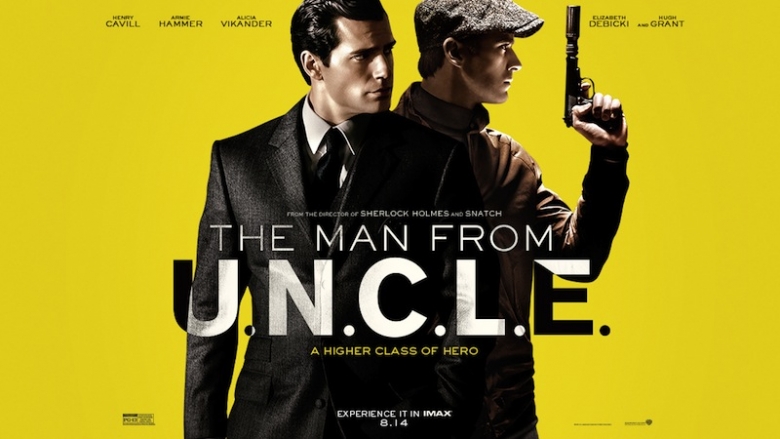Last updated on February 21, 2016
 I like being surprised when I watch films. What the heck am I going to see this time around? When you hear about all the super hero movies coming out (along with their corresponding CINEMATIC UNIVERSES, not to mention the advent of a new Star Wars movie every single year), I despair for new and fresh experiences that don’t appeal to everyone. When a film studio decides to revive a 1960s TV series in order to create another new film franchise, that sounds about right for the times, but sometimes you’ll end up pleasantly surprised.
I like being surprised when I watch films. What the heck am I going to see this time around? When you hear about all the super hero movies coming out (along with their corresponding CINEMATIC UNIVERSES, not to mention the advent of a new Star Wars movie every single year), I despair for new and fresh experiences that don’t appeal to everyone. When a film studio decides to revive a 1960s TV series in order to create another new film franchise, that sounds about right for the times, but sometimes you’ll end up pleasantly surprised.
In a way, The Man from U.N.C.L.E. is that breath of fresh air, a pretty standard Cold War-era thriller that’s plenty engaging. Actually “engaging” seems a bit much to describe the film, considering it has zero pretense to connect with viewers on an emotional level. Rather, its primary directive is complete, self-indulgent “cool” and lots of witty humor. The film seems to understand its plot and story would appear boring and rote in nearly any other similar genre picture, so it compensates via other factors. Let me just copy the plot synopsis from IMDB just to drive the point home:
In the early 1960s, CIA agent Napoleon Solo and KGB operative Illya Kuryakin participate in a joint mission against a mysterious criminal organization, which is working to proliferate nuclear weapons.
Wow, does this ever sound boring. But The Man from U.N.C.L.E. (a name which will never make sense, and seems like a horrible name to market) rarely dips its toes into traditional genre territory. Rather, it almost acts as an extended satire for the entire running length. The suave American is a serial womanizer; the boorish Russian likes to break people and things. They don’t like to work together, in that buddy-cop sort of way, and this is played for some really dark, dry-as-a-bone laughs. Honestly, some of the things which happen in Guy Ricthie’s adaption seem absolutely ridiculous, but the tone establishes a complete lack of seriousness from the get-go (also, SPOILER it’s the first film in a long time that made me laugh at a man being electrocuted to the point where he starts smoking, so there’s that SPOILER END).
As a warning, though, the film is seriously dry in its approach to humor. If you don’t like that sort of thing, prepare to sit in awkward confusion for nearly 2 hours.
The actors cast for the roles play against type, which is yet another layer of humor, just for example. You might know Henry Cavill as…well…Superman, the Man from Krypton with a heart of gold and a moral compass to match. Here, Cavill plays completely against type, bedding any and every woman possible on his way to fulfilling his mission objectives. Armie Hammer, who seems continually cast in roles as “the generic good guy”, becomes a bit of a psychopath and a violent one at that. Honestly, it seems like the whole cast had a ton of fun, and the late (too late, in my opinion) introduction of British fop Hugh Grant into the proceedings just seems like icing on the cake. The Man from U.N.C.L.E. seems utterly self-aware that it’s a film, and that helps its entertainment value greatly.
Not surprisingly, The Man from U.N.C.L.E. also attempts to re-capture the vibe of its period, almost like a glamorized version of the 1960s. Frankly, I’m sure we could point out inconsistencies with the actual era should we choose, but it hews to an idealized form of the exotic locales which 1960s spy-action films reveled in. That extends to the soundtrack as well, which somehow perfectly carries the vibe of the film while being eminently listenable in and of itself (I couldn’t help but find it on Spotify and listen to it repeatedly, that’s for sure. Whoever picked these selections certainly had something going). In a phrase, think of the 1960s James Bond, and you will have a general idea of The Man from U.N.C.L.E., only with a newly revised aesthetics strictly adhering to a wonderful fantasy world of spies.
So, if any of this sounds appealing, I would tell you to venture out and watch The Man from U.N.C.L.E. as soon as humanly possibly. Were I to compare the film to Spectre, I can tell you which one I enjoyed more. The only notable criticism I can level at this fine spy film lies in its utter predictability, and the fact that there’s really no connection to be had from a story perspective. You really won’t care what happens – then again, that’s not the point, and if you were looking for that plenty of other films fill that quota. Just revel in the sheer artificiality of The Man from U.N.C.L.E., and you’ll have a great time.
